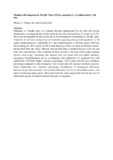Please use this identifier to cite or link to this item:
https://cris.library.msu.ac.zw//handle/11408/3227Full metadata record
| DC Field | Value | Language |
|---|---|---|
| dc.contributor.author | Muziri, Tavagwisa | - |
| dc.contributor.author | Theron, K.I. | - |
| dc.contributor.author | Crouch, E.M. | - |
| dc.date.accessioned | 2018-10-02T15:34:38Z | - |
| dc.date.available | 2018-10-02T15:34:38Z | - |
| dc.date.issued | 2015 | - |
| dc.identifier.issn | 0567-7572 | - |
| dc.identifier.uri | https://doi.org/10.17660/ActaHortic.2015.1094.69 | - |
| dc.identifier.uri | http://hdl.handle.net/11408/3227 | - |
| dc.description.abstract | Mealiness in ‘Forelle’ pear is a textural disorder characterised by dry and soft texture deterioration, occurring mostly in fruit stored for less than the mandatory 12 weeks at -0.5°C. This study investigated the role of cell size in the development of mealiness in ‘Forelle’ pear. Variations in cell sizes among fruit were incited by applying plant growth regulators: 2,4-D amine, prohexadione-Ca, gibberellin 4+7 and forchlorfenuron at different stages following bloom during the 2011 season. In 2012, hand thinning of fruit was done on blossom clusters, leaving fruit from the “king” blossom and one fruit from a smaller blossom. Cell size and other cell characteristics were examined on dried sections of the fruit cortex using scanning electron microscopy. Treatments that induced fruit with larger cells had higher mealiness percentage. Forchlorfenuron and its combination with gibberellin 4+7 produced fruit with significantly (P=0.038) higher mealiness percentage. 2,4-D amine had the least mealiness percentage compared to other treatments. Cell volume and cell diameter exhibited a positive linear relationship with mealiness percentage. Examination of histological differences between mealy and non-mealy fruit revealed differences in size of intercellular spaces with mealy fruit having larger spaces. The results from this study suggest that cell size and size of intercellular spaces are linked to the development of mealiness. | en_US |
| dc.language.iso | en | en_US |
| dc.publisher | International Society for Horticultural Science | en_US |
| dc.relation.ispartofseries | Acta Horticulturae;Vol. 1094: p. 515-523 | - |
| dc.subject | Pyrus communis L. | en_US |
| dc.subject | Scanning electron microscopy | en_US |
| dc.subject | Mealiness percentage | en_US |
| dc.subject | Cell diameter | en_US |
| dc.subject | Cell volume | en_US |
| dc.subject | Texture | en_US |
| dc.title | Mealiness development in ‘Forelle’ pears (Pyrus communis L.) Is Influenced by cell size | en_US |
| dc.type | Article | en_US |
| item.cerifentitytype | Publications | - |
| item.openairetype | Article | - |
| item.openairecristype | http://purl.org/coar/resource_type/c_18cf | - |
| item.grantfulltext | open | - |
| item.fulltext | With Fulltext | - |
| item.languageiso639-1 | en | - |
| Appears in Collections: | Research Papers | |
Files in This Item:
| File | Description | Size | Format | |
|---|---|---|---|---|
| Mealiness Development in.pdf | Abstract | 186.75 kB | Adobe PDF |  View/Open |
Page view(s)
166
checked on Jan 30, 2026
Download(s)
56
checked on Jan 30, 2026
Google ScholarTM
Check
Items in MSUIR are protected by copyright, with all rights reserved, unless otherwise indicated.



